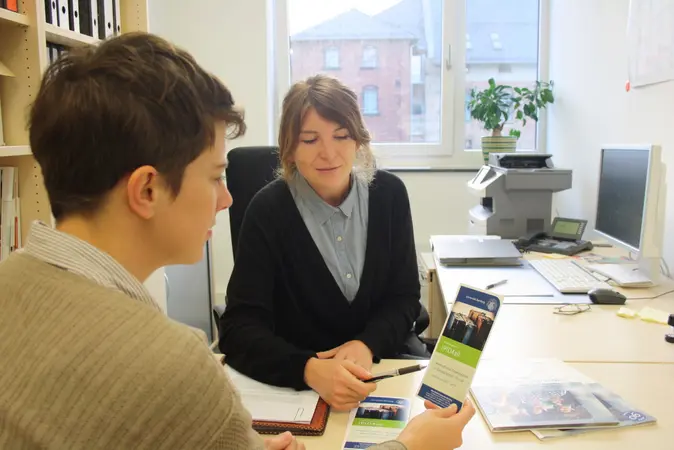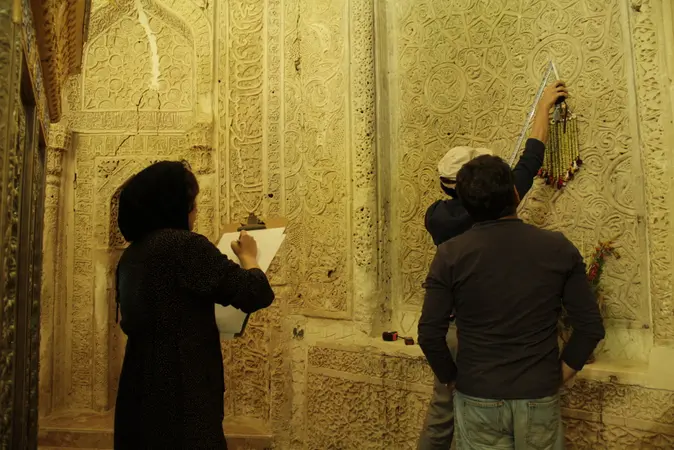Individual advice is part of Simone Treiber’s (pictured right) work as project coordinator for IPID4all.
Extension of Doctoral Education Funding Programme IPID4all
The IPID4all funding programme, which has been offering financial support for Bamberg students as well as foreign doctoral candidates since 2014, will now be extended until 30 September 2019. IPID stands for “International Promovieren in Deutschland”: International Doctoral Studies in Germany. IPID4all is an affiliate of the Trimberg Research Academy and offers students from Bamberg two grant options for financial aid for research trips abroad. It provides funding for research periods of up to three months as well as travel funding for active participants at conferences lasting up to five days. The programme also offers intensive German courses for foreign scholars using the language for both everyday and research purposes. A third grant option allows foreign postgraduates and doctoral candidates to spend a three-month research period at the University of Bamberg in order to conduct research and personally gather more information on doctoral study options offered in Bamberg. Professors at the University of Bamberg may also invite postgraduates and doctoral candidates from foreign universities to participate in such a research period in Bamberg. In addition, the graduate schools at the University of Bamberg will receive financial support for the organization of international symposia.
Internationalising Doctoral Studies
The goal of the German Academic Exchange Service (DAAD) is to utilise funding from the German Federal Ministry of Education and Research to internationalise doctoral studies and to support world-wide knowledge exchange between universities in Germany and abroad. “With the help of this funding programme, we hope to help both students from Bamberg and foreign students to embark on an international academic career without boundaries,” explains Simone Treiber, the IPID4all project coordinator.
Sponsored conference participation
In 2017, 26 doctoral candidates received an IPID4all scholarship. Among them were also two foreign researchers that had the opportunity to get to know the University of Bamberg during a two-week trial research period. Crucial criteria for the selection of the applicants with regard to all funding opportunities are academic qualification, the quality of the previous research work and the quality of the research project to be completed abroad.
Ten of the 26 sponsored researchers took part in an international conference, among them Benjamin Jäcklin, doctoral candidate at Professor Karin Heinrichs’ Professorship of Economics and Business Education at the University of Bamberg. In Tampere, Finland, he presented his doctoral project at the 21st Conference of the Junior Researchers organised by the European Association for Research on Learning and Instruction and is glad the IPID4all programme facilitated his attendance. “After participating in the conference, and especially after discussing methodological aspects of my project following my presentation, I was able to take some valuable ideas with me,” Jäcklin explains.
(Field) Research abroad
13 of the 26 sponsored researchers began research stays abroad that were completed not only at universities, but also in companies, archives, or museums. Maryam Moeini, doctoral candidate at the Chair for Islamic Art and Archaeology, spent a five-week period of field research in the province of Arak and at the University of Kashan in Iran. As part of her dissertation, she is researching West-Iranian mausolea of the eleventh and twelfth centuries and is examining numerous buildings that, up to now, have not yet been documented or only documented insufficiently. “With the IPID4all funding, I was able to work with an Iranian team to survey, document, photograph and sketch the architectural layout of three additional mausolea out of the 35 that are part of my PhD project,” explains the monument researcher with an Iranian background.
This press release was translated by Benjamin Wilson.

